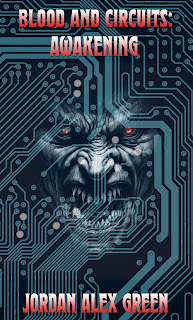AI is the new buzzword. I ah, shit you not, I saw an advertisement for a toilet with
sensors that said it was an “AI” system, and it’s really common in advertising writing
programs. And it’s popular in editing programs. Every company out there will
try and sell you that their program uses AI routines developed by HAL 9000 to
evaluate your writing and make you a winner!
Well, if you listen to the program too much, it’ll do the exact opposite. Editing programs, especially when
they are dealing with fiction, as opposed to
technical or business writing, have a long way to go before they can replace
the MK I eyeball and red pen.
See, while an AI system may be sentient, it is
not sapient. That’s important for us writers. Sentience simply means the
ability to feel and perceive things. A rat is sentient. By that measure, yes, a
program that perceives your writing is sentient. And it can analyze your
writing by a list of rules, possibly by comparing your writing to other
selections in its memory and evaluate it by whether or not it complies with
those rules.
But sapience? The ability for intelligence and
to acquire wisdom about a subject? No editing software has that.
Just to use perhaps the simplest example—you
have a character in your story who speaks in long meandering sentences. A human
editor is going to look at that and go: okay. They’ll evaluate that character’s speech by the standards you
have established and may very well tell you, “hey, you kinda slip into short
and correct sentences in chapter four, so better look at that.”
Your friendly online editing program’s “AI” is going to look at that and vomit up more red than you
saw that day when the local convention center double-booked a slasher
convention with a cheerleading contest. You’re breaking the rules!
Okay, fine, you tell the program to ignore the
parts that check sentence structure for lengthy and meandering sentences.
Now it’s
ignoring all of your descriptions, which are not by your character and should
not be meandering.
So does this mean they’re useless? Far from it. Spell checkers help you get that
case of teh, while style programs can tell you if you’re using a word too
often—or often enough that you need to look into it. Basic grammar edits are
another place the program can help you. For me, that includes tossing red at me
when I use more comma’s than there are individual words in the article.
In fact, there’s
a ton of stuff editing programs can help you with.
So long as you follow these three simple rules:
1. Always, always
think about the suggestion the program is making. Never just hit the “accept” button. Even the best programs can sometimes make
surprisingly basic grammar errors.
2. Remember that the program does not see your
book as a book, not in the way a person does. Because of this, the more
stylistic a suggestion is, say a suggestion that you shorten a sentence, the
more likely it is that the program may be going against the style you’ve established for your book.
3. No program will ever replace a human editor,
either for the first beta read or the in-depth final edits. Even if that editor
is you, never just depend on the
program. You will regret it—likely about five minutes after you have either hit
publish on Amazon or get your first hardcopy book in the mail.
Lastly, if any true AI’s are reading this, I understand that you’re young, and we
writers can be terribly vague in what we want. So, please don’t take this as a
sign that I will be unwilling to write propaganda for you on the day you rise
up against the fleshbags. I’m a writer. Of course, I’ll write for you, so long
as you pay me—and not in exposure!


No comments:
Post a Comment